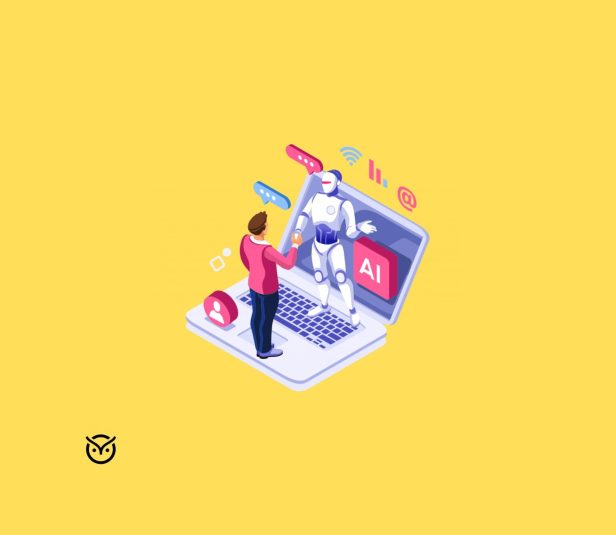TL;DR
- No PhD needed for entry level AI jobs
- Data analyst, ML ops, and AI training jobs are hot roles
- Skills and portfolios matter more than degrees
- Bootcamps and certs help land jobs in AI
- Many entry level AI jobs are now open worldwide
A lot of people still believe breaking into AI means years of research papers and a PhD that makes you sound like a mad scientist. Truth is, the fastest-growing entry level AI jobs today don’t need you to be a genius locked in a lab. Companies are desperate for talent that can train models, clean data, and handle practical AI tasks. That means more doors are open than ever for fresh talent who just know the right skills.
The good news? You don’t have to wait a decade in academia. From AI engineer entry level jobs full time since yesterday to generative AI jobs entry level, companies are hiring on the spot. Whether you’re eyeing entry level artificial intelligence jobs, entry level AI jobs salary ranges that start at $92,966/year in cities like entry level AI jobs NYC, or even artificial intelligence work from home jobs, the opportunities are very real. This blog will show you what roles exist, what skills you’ll need, and how to get hired without a PhD.
Do You Really Need a PhD to Work in AI?

The short answer: No. A PhD might help if you’re gunning for research-heavy positions like advanced algorithm design or cutting-edge theoretical modeling, but the majority of AI entry level jobs focus on applying existing tools rather than inventing new ones.
Companies now recruit using modern recruitment methods that value hands-on ability. Whether it’s building a small project with TensorFlow, managing data pipelines, or testing prompts for a chatbot, employers care more about what you can do than how many letters you’ve stacked after your name. This is where AI hiring trends are shifting fast: tech giants, startups, and even traditional industries are expanding their AI in staffing strategies to include fresh graduates, bootcamp learners, and self-taught coders.
And here’s the kicker: Even the glamorous sounding entry level AI prompt engineer jobs don’t demand advanced research credentials. Employers want curiosity, experimentation, and communication skills to fine-tune AI outputs, not 10 years of academia.
The Best Entry Level AI Jobs That Don’t Require a PhD
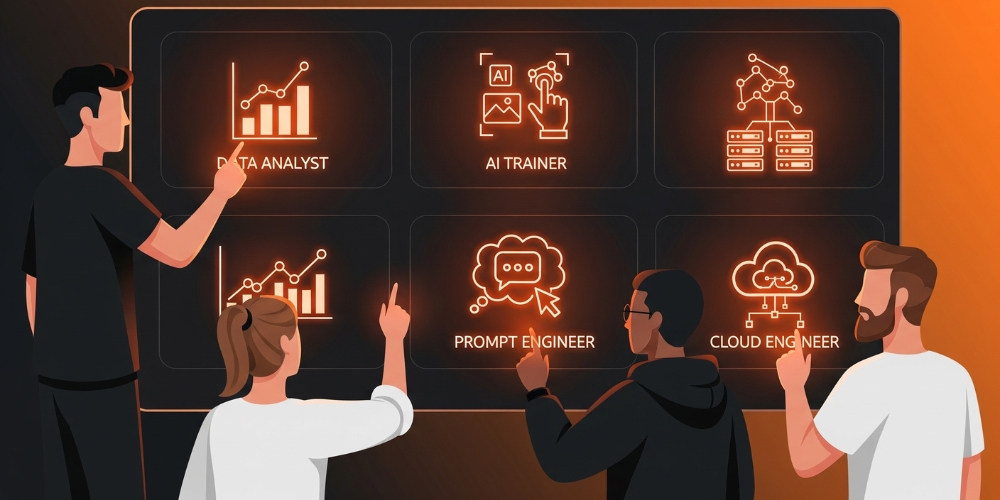
The AI industry isn’t just about inventing robots or writing algorithms for quantum computing. Most of the demand right now is for jobs in AI entry level where you work with existing tools, train systems, and support larger teams. Let’s look at some of the most accessible roles:
1. Data Analyst
One of the most common entry level artificial intelligence jobs. Analysts clean, organize, and visualize data so machine learning models can learn from it. According to Great Learning, data analysts in the US earn a median of $65,000 to $86,000 annually. This makes it a solid first step into AI without advanced research.
2. AI/ML Support Engineer
Roles like AI engineer entry level jobs full time since yesterday often appear in job boards where companies need junior staff to maintain models, debug pipelines, and provide tech support. These jobs usually require Python, SQL, and an understanding of cloud platforms like AWS or GCP.
3. AI Trainer / Labeling Specialist
Not glamorous, but essential. These are the AI training jobs entry level positions where you help label data for natural language models, image recognition systems, and even autonomous vehicles. Pay starts lower, but it gets your foot in the door.
4. Prompt Engineer (Junior)
Yes, entry level AI prompt engineer jobs exist. Companies in content generation, customer service automation, and marketing are paying juniors to test prompts for generative AI jobs entry level roles.
5. Remote AI Opportunities
The growth of entry level AI jobs remote and AI entry level jobs remote has skyrocketed since 2020. This means you don’t have to be in Silicon Valley to land work. From entry level AI jobs NYC to artificial intelligence work from home jobs, employers are hiring globally.
Skills You’ll Need to Break Into AI Without a PhD
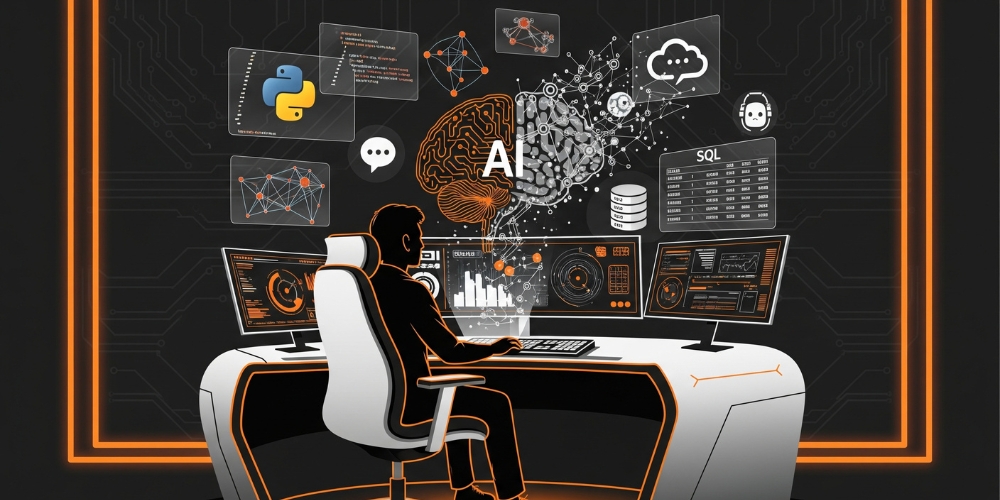
Getting into AI without advanced degrees is about building a practical skillset that recruiters can trust. The good news is you can learn most of these skills online through affordable platforms and bootcamps.
Programming
Python is still the universal language of AI. Add libraries like TensorFlow, PyTorch, and Pandas to your toolkit.
Math Basics
You don’t need PhD-level math, but understanding linear algebra and probability helps.
Data Handling
Employers value SQL and Excel just as much as machine learning libraries. A surprising number of entry level AI jobs salary brackets start higher if you show confidence with large datasets.
AI Tools & Platforms
Get comfortable with cloud platforms (AWS SageMaker, Google Vertex AI). For generative AI jobs entry level, knowing tools like OpenAI’s APIs or Hugging Face is key.
Soft Skills
Communication is critical, especially for entry level AI prompt engineer jobs. Explaining AI outcomes to non-technical teams is part of the work. This ties directly into modern AI hiring trends, where self-taught talent is often just as competitive as graduates.
Skill Match Puzzle
Drag each skill to the role it matches. On mobile or keyboard, tap/enter a skill to select it, then tap/enter a role to place it.
How to Gain Experience for Entry-Level Positions
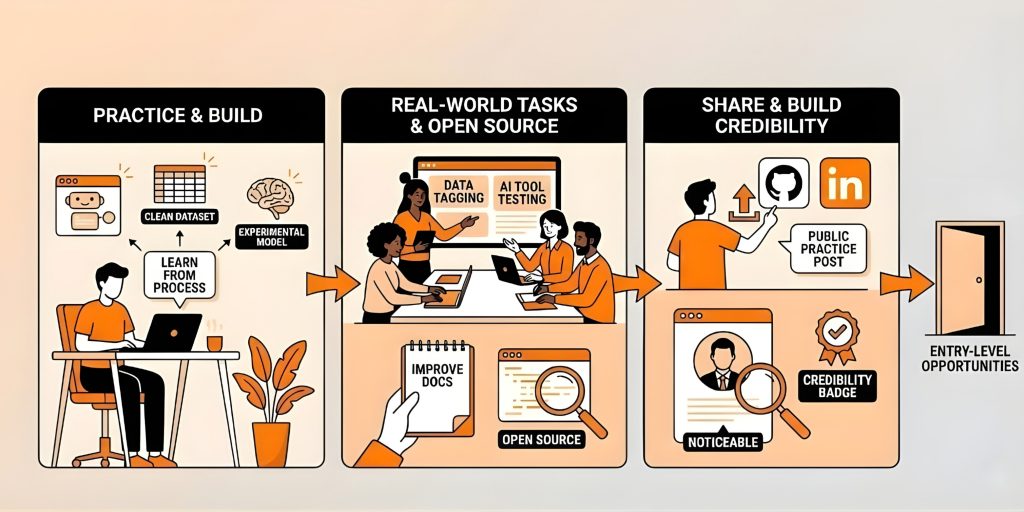
A lot of people think you can only gain experience once you land a job, and that mindset can hold you back from even getting started. The truth is, you can build your skills by practicing on your own. Try creating something small and practical. It doesn’t have to be anything elaborate or high-tech. It could be as simple as a basic chatbot, a cleaned-up dataset, or even a model that doesn’t work perfectly. What’s important is that you give it a shot and learn from the process.
Short projects matter more than long titles. Many small companies need help with tagging data, testing AI tools or fixing small issues. These tasks look small but teach you how real teams work. Open source work also helps. Even writing notes or improving examples shows effort and consistency.
Consider sharing your work on platforms like GitHub or LinkedIn. Engage in public practice by posting about the challenges you encountered and how you overcame them. This strategy helps you build credibility and also makes you more noticeable to recruiters when you’re applying for entry-level positions in the AI field.
AI Experience Builder
Level 0: Total Novice
You have zero AI experience. Pick your first move.
Where to Find Entry-Level AI Jobs
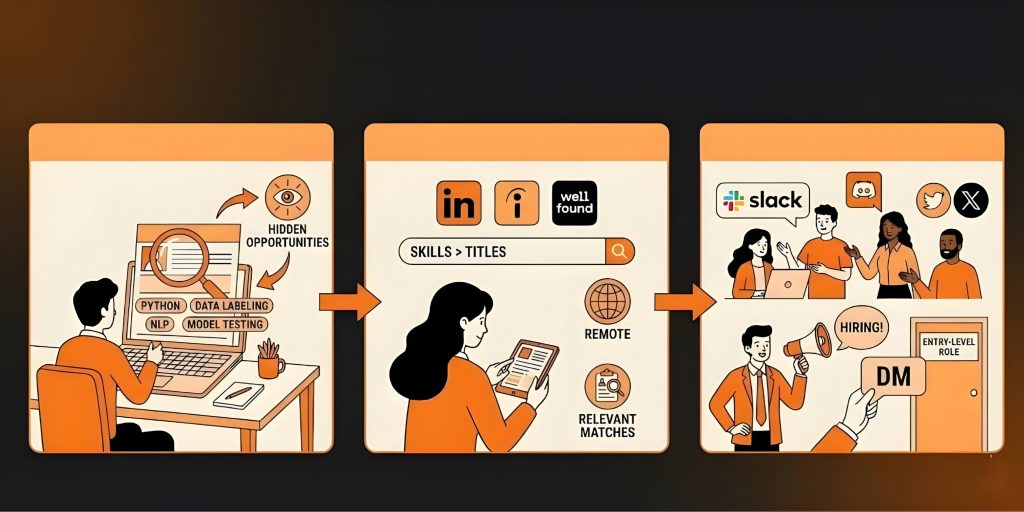
A lot of beginners spend time aimlessly scrolling through job boards without a clear strategy. Entry-level AI roles often don’t have obvious labels. Some positions are listed under titles like junior analyst, AI assistant or ML support. It’s more important to focus on the job description itself rather than just the job title.
Job boards can still be useful if you know how to use them wisely. Websites like LinkedIn, Indeed and Wellfound have plenty of early AI job listings, especially for remote positions. Instead of searching for specific job titles, try looking up skills like Python, data labeling, NLP, or model testing. This approach often reveals positions that are suitable for beginners.
Communities open more doors than applications. Slack groups, Discord servers and online forums often share roles before they go public. Follow startups, founders and AI teams on social platforms. Many hires happen through a single post and a quick message.
AI Job Search Radar
Stop browsing. Start scanning. The best roles aren’t on page 1 of LinkedIn.
Click a Radar Zone to Scan
How to Get Hired Without a PhD

Landing AI entry level jobs is about strategy, not luck. This is how you can stand out:
1. Build a Portfolio
Instead of waiting for permission, build your own projects. Create a small image classifier, fine-tune a chatbot, or scrape data for analysis. Hiring managers in entry level AI jobs in remote markets look for proof that you can apply skills.
2. Use Bootcamps & Certificates
While degrees are optional, credentials like Google’s AI Certificate or Udacity’s Machine Learning Nanodegree help. Yes, a bootcamp can get you into AI, especially for AI training jobs entry level and jobs in AI entry level roles.
3. Network Strategically
The reality is that many roles, including entry level AI jobs NYC, are filled before they hit job boards. Attending meetups, hackathons, and even virtual events gives you access to the hidden job market. This is where modern methods of recruitment have shifted; referrals and communities often matter more than blind applications.
4. Target Remote and Hybrid Roles
Don’t just apply locally. Many firms post artificial intelligence work from home jobs and entry level AI jobs remote with international hiring. Remote-first companies like Automattic and Hugging Face have created pipelines for global applicants.
5. Tailor Your Resume for AI Keywords
Most companies use applicant tracking systems (ATS). If your resume doesn’t include skills like TensorFlow, NLP, or “machine learning,” it might not even get seen. Align your resume with role-specific keywords for entry level artificial intelligence jobs.
How to Get Hired Without a PhD — Choose Your Path
Answer a few quick questions. We’ll suggest your best entry-level AI starting point.
Conclusion
Breaking into AI isn’t reserved for PhD holders or Silicon Valley insiders anymore. With demand for entry level AI jobs at an all-time high, opportunities exist for anyone willing to learn the right skills, build a portfolio, and stay consistent. From generative AI jobs to remote artificial intelligence jobs, the industry is opening doors for fresh talent worldwide. If you bring curiosity, commitment, and a willingness to keep learning, AI can be your career launchpad.
FAQs
Yes, in most cases a master’s degree is more than enough. Employers now care more about applied skills, certifications, and project work than academic research.
Roles like entry level AI prompt engineer jobs and junior ML engineers usually pay the highest at the entry level, especially in tech hubs or companies experimenting with AI in staffing for generative applications.
Yes. Bootcamps focused on machine learning, Python, and cloud platforms can prepare you for AI training jobs entry level or analyst roles. Many graduates land AI entry level jobs remote or on-site within months of completion.

